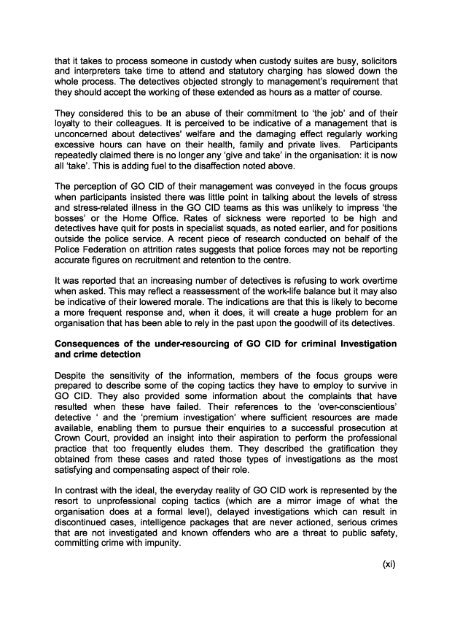LOSING THE DETECTIVES: VIEWS FROM THE ... - Police Federation
LOSING THE DETECTIVES: VIEWS FROM THE ... - Police Federation
LOSING THE DETECTIVES: VIEWS FROM THE ... - Police Federation
You also want an ePaper? Increase the reach of your titles
YUMPU automatically turns print PDFs into web optimized ePapers that Google loves.
that it takes to process someone in custody when custody suites are busy, solicitors<br />
and interpreters take time to attend and statutory charging has slowed down the<br />
whole process. The detectives objected strongly to management’s requirement that<br />
they should accept the working of these extended as hours as a matter of course.<br />
They considered this to be an abuse of their commitment to ‘the job’ and of their<br />
loyalty to their colleagues. It is perceived to be indicative of a management that is<br />
unconcerned about detectives' welfare and the damaging effect regularly working<br />
excessive hours can have on their health, family and private lives. Participants<br />
repeatedly claimed there is no longer any ‘give and take’ in the organisation: it is now<br />
all ‘take’. This is adding fuel to the disaffection noted above.<br />
The perception of GO CID of their management was conveyed in the focus groups<br />
when participants insisted there was little point in talking about the levels of stress<br />
and stress-related illness in the GO CID teams as this was unlikely to impress ‘the<br />
bosses’ or the Home Office. Rates of sickness were reported to be high and<br />
detectives have quit for posts in specialist squads, as noted earlier, and for positions<br />
outside the police service. A recent piece of research conducted on behalf of the<br />
<strong>Police</strong> <strong>Federation</strong> on attrition rates suggests that police forces may not be reporting<br />
accurate figures on recruitment and retention to the centre.<br />
It was reported that an increasing number of detectives is refusing to work overtime<br />
when asked. This may reflect a reassessment of the work-life balance but it may also<br />
be indicative of their lowered morale. The indications are that this is likely to become<br />
a more frequent response and, when it does, it will create a huge problem for an<br />
organisation that has been able to rely in the past upon the goodwill of its detectives.<br />
Consequences of the under-resourcing of GO CID for criminal Investigation<br />
and crime detection<br />
Despite the sensitivity of the information, members of the focus groups were<br />
prepared to describe some of the coping tactics they have to employ to survive in<br />
GO CID. They also provided some information about the complaints that have<br />
resulted when these have failed. Their references to the ‘over-conscientious’<br />
detective ‘ and the ‘premium investigation’ where sufficient resources are made<br />
available, enabling them to pursue their enquiries to a successful prosecution at<br />
Crown Court, provided an insight into their aspiration to perform the professional<br />
practice that too frequently eludes them. They described the gratification they<br />
obtained from these cases and rated those types of investigations as the most<br />
satisfying and compensating aspect of their role.<br />
In contrast with the ideal, the everyday reality of GO CID work is represented by the<br />
resort to unprofessional coping tactics (which are a mirror image of what the<br />
organisation does at a formal level), delayed investigations which can result in<br />
discontinued cases, intelligence packages that are never actioned, serious crimes<br />
that are not investigated and known offenders who are a threat to public safety,<br />
committing crime with impunity.<br />
(xi)
















